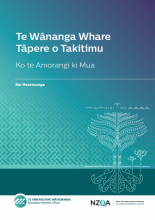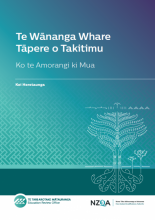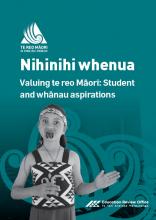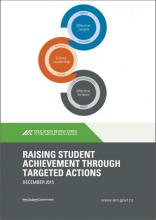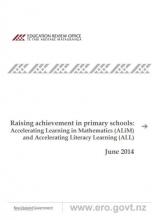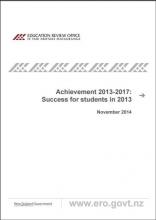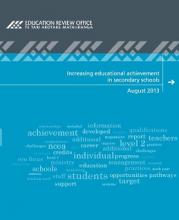- Topics: Accelerated learning, Achievement, Te Pou Mataaho | Evaluation and Research Māori
- Published: 19 Jan 2021
Te Kahu Whakahaumaru – Ngā mahi a te rangai mātauranga Māori (English)
Te Pou Mataaho, ERO’s evaluation and research group, and Te Uepū ā Motu, ERO’s national evaluation and review team, pursued this evaluation to provide an evidence base about the initial impacts of Covid-19 on Māori-medium education and how the sector responded.
- Published: 19 Jan 2021
Te Kahu Whakahaumaru – Ngā mahi a te rangai mātauranga Māori (Māori)
I whāia tēnei arotake e Te Pou Mataaho, te rōpū arotake, rangahau hoki a Te Tari Arotake Mātauranga me Te Uepū ā-Motu, te rōpū arotake ā-motu a Te Tari Arotake Mātauranga, ki te whakaputa i tētahi kohinga taunakitanga e kitea ai ngā pānga tōmua o te Mate Korona ki te rāngai mātauranga reo Māori, me ngā rautaki i whāia ai e taua rāngai.
- Published: 10 Dec 2020
Te Kahu Whakahaumaru: Māori continue to show resilience across Māori-medium education
In Aotearoa, Māori-medium education experienced significant disruption when the outbreak of Covid-19 forced kura to close their doors, and whānau and kaiako to adjust to home schooling and distance learning. Among the many challenges were access to technology and resources with Māori communities among the most affected.
- Published: 10 Dec 2020
E whakatinana tonu nei te rāngai mātauranga reo Māori i te manawanui
I Aotearoa nei, i tino raru te rāngai mātauranga reo Māori i te horapatanga o te Mate Korona, i kati ai ngā tatau o ngā kura, i mate ai hoki ngā whānau me ngā kaiako ki te tīni i ā rātou mahi ki te whakaako ki te kāinga me te ako tawhiti.
Ko tētahi raru i roto i te huhua, ko te korenga o ngā taputapu matihiko me ngā rauemi, ka mutu ko ngā hapori Māori ērā i rongo i te korekore rawa atu nei.
- Published: 15 Sep 2020
Nihinihi Whenua – Valuing te reo Māori: Student and whānau aspirations
This report provides a snapshot of student and whānau perspectives on the teaching of te reo Māori. It follows the June publication of Te Tāmata Huaroa, which provides a review of the current status of te reo Māori in English medium school settings.
- Published: 18 Jun 2020
Te Tāmata Huaroa: Te Reo Māori in English-medium Schooling
This report gives a snapshot of the current provision of te reo Māori teaching and learning in a representative sample of English-medium primary and secondary schools. The education sector is seen as an important lever in the Government’s Maihi Karauna strategy for language revitalisation.
- Published: 11 Jun 2019
Keeping children engaged and achieving in writing
This report shares some of the strategies and approaches used by schools who had focused on improving achievement in writing. It also shares some simple strategies used in classrooms where achievement in writing had been accelerated.
- Published: 29 Nov 2018
Keeping children engaged and achieving through rich curriculum inquiries
This Education Review Office (ERO) report is one of a series of reports on teaching strategies that work. It features strategies and approaches that we observed in 40 primary schools selected from across New Zealand. These schools came from a database of 129 schools, all with rolls of 200 or more, in which the proportion of students in the upper primary years (Years 5 to 8) achieving at or above the expected standard had increased. In each case, achievement levels were also above average for the decile.
- Published: 14 May 2018
Teaching strategies that work - Reading
The Education Review Office (ERO) has released the latest in its Teaching Strategies that Work series. “Keeping children engaged and achieving in reading” is a description of strategies used by primary schools which have significantly improved their students’ achievement in reading.
- Published: 20 Feb 2018
Teaching strategies that work - Mathematics
This Education Review Office (ERO) report is one of a series of reports on teaching strategies that work. It features strategies and approaches that we observed in 40 primary schools selected from across New Zealand. These schools came from a database of 129 schools, all with rolls of 200 or more, in which the proportion of students in the upper primary years (Years 5 to 8) achieving at or above the national standard had increased. In each case achievement levels were also above average for the decile.
- Published: 14 Feb 2017
School trustees booklet: helping you ask the right questions
ERO has written this booklet for boards of trustees. It is one of many tools available to help you in your role as a trustee. It focuses on student achievement and wellbeing, and the role the board plays in these two areas. The booklet includes questions and information that will guide you in your discussions with school leaders and as a trustee.
- Published: 18 Dec 2015
Raising student achievement through targeted actions
In 2015, ERO investigated target setting in both primary and secondary schools. We focused on the extent to which targeted actions of schools supported accelerated progress for students at risk of not achieving.
- Published: 09 Nov 2015
Educationally powerful connections with parents and whānau
In this report, the Education Review Office (ERO) evaluated how well 256 schools worked with parents and whanau to respond to students at risk of underachievement. We looked for examples where schools had specifically worked with parents and whānau to accelerate and support progress and improve achievement.
- Published: 30 Jun 2014
Raising achievement in primary schools
This national report presents the findings of how well a sample of primary schools were taking actions to increase the number of students achieving 'at' or 'above' national standards.The findings show that half of the schools in the evaluation had used deliberate actions to support students to accelerate progress and sustain achievement.
- Published: 26 Jun 2014
Raising achievement in primary schools ALiM and ALL
This national report is a companion report to Raising achievement in primary schools. It presents further findings of how some of the primary schools were using the Ministry-funded support projects - Accelerated Learning in Mathematics (ALiM) and Accelerated Learninig in Literacy (ALL) to accelerate progress and raise achievement.
- Published: 11 May 2014
Achievement 2013-2017: Success for students in 2013
This report presents the findings of ERO’s evaluation of the Ministry of Education's initiative, Achievement 2013-2017.
- Published: 28 Aug 2013
Schools’ Provision for International Students
This national report is ERO’s seventh report about international students. This evaluation included 95 schools (both primary and secondary) and focused on five aspects in relation to international students – integration, progress and achievement, education programme, pastoral care, overall approach and self review.
- Published: 15 Aug 2013
Increasing Educational Achievement in Secondary Schools
This national report presents the findings of ERO’s recent evaluation of the practices used in an initiative to support the improved achievement of a specific group of Year 12 students.
